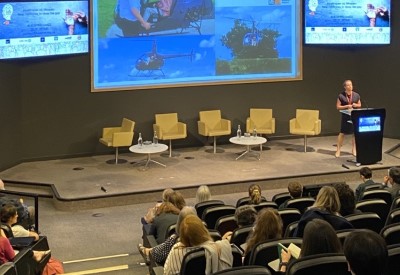UK SPINE Annual Conference returned in-person

A summary by Pavel Ovseiko, University of Oxford Research Fellow and UK SPINE conference participant.
There was a certain level of excitement in the air on 27-28th June 2022 at the Alderley Park Conference Centre, where the UK SPINE annual conference returned to an in-person setting following two years of pandemic-related virtual conferences. Focusing on the theme “Healthspan vs Lifespan: New Medicines to Close the Gap,” the conference sought to reimagine how new medicines could help improve healthspan, i.e. the period of a person's life during which they are not just alive, but healthy and free from serious illness.
A rich and thought-provoking program featuring over 40 speakers and panellists was presented over two days. Kicking off the conference was a welcome from Harriet Teare and Graeme Wilkinson, who introduced the conference against the backdrop of Alderley Park – home of the Medicines Discovery Catapult, one of UK SPINE’s key hub partners.
A keynote by Jesus Gil set the scene for the conference. Jesus gave a comprehensive overview of the progress achieved in ageing research over the last decades with regard to various hallmarks of ageing. He specifically focussed on how targeting senescent cells can improve healthspan, increase lifespan, and address multiple long term conditions associated with ageing.
A panel discussion, chaired by Janet Lord, brought to the fore the importance of engaging patients and the public in ageing research. The discussion highlighted the need to think about the patient as a whole and focus efforts on maintaining functionality in old age.
Following lunch and a walking tour of the site, presentations by Eleanor Platt, Lorna Fitzpatrick, Lynne Cox and Phil Atherton, Satomi Miwa, Ghada Alsaleh, and James Edwards showcased some of the UK SPINE supported Proof of Concept projects. The presentations spanned a wide variety of topics, ranging from the potential to repurpose rapamycin to alleviate immune ageing, to fundamental science investigating the action of bisphosphonates, to the potential for spermidine to be used to increase effectiveness of vaccination efforts. The array of projects demonstrates the depth and breadth of the UK SPINE translational research portfolio.
Breakout sessions provided delegates with opportunities to discuss challenges and potential solutions across four topics: targets for multi-morbidity in ageing, clinical trials to help tackle multi-morbidities, patient and public involvement, and knowledge exchange. The discussions that evolved included addressing and solving the challenges of including patients with multiple long-term conditions in clinical trials, looking prospectively at healthy people, and working across multiple sectors emerged as promising avenues across many topics.
A dinner talk by writer Andrew Steele at Shrigley Hall Hotel provided a fitting end to a truly memorable first day. Andrew talked about his new book Ageless and sparked a lively discussion on whether ageing can be prevented or “cured”.
Day two started with a rousing keynote by social entrepreneur Tina Woods, who addressed the role of artificial intelligence in helping us extend our healthspans using insights from her book “Live Longer with AI”. One of the key insights was about the need to consider “psychological age” in ageing research.
In a reprise of the workshop format popular in day one, four further workshops engaged participants in facilitated discussions around regulation, translational biomarkers, start-ups in the healthy ageing space, and outcomes assessment in healthy ageing trials.
A presentation by Michael Hopkins opened eyes on strategies to facilitate boundary-spanning collaborations and charted the progress of UK SPINE in working across organisational boundaries. The network maps based on interactions and collaborations within UK SPINE vividly demonstrated a formidable increase in knowledge exchange between UK SPINE partners and the wider healthy ageing network over the last three years.
A panel of industry experts looked at what’s on the horizon for ageing research and companies working in this sector. A major opportunity for UK SPINE was identified in bridging the gap between industry typically working on a single disease and a single biomarker, and the need to address multiple diseases and multiple biomarkers.
As the conference drew to a close, Harriet Teare thanked everyone for their active participation and engagement. As the field of ageing research is relatively new and some might say, fragmented, the conference succeeded beyond expectation in bringing the UK SPINE community back together in-person again. It is hoped that many of the conversations and interactions that took place at the conference will continue to shape the ageing research agenda for years to come.